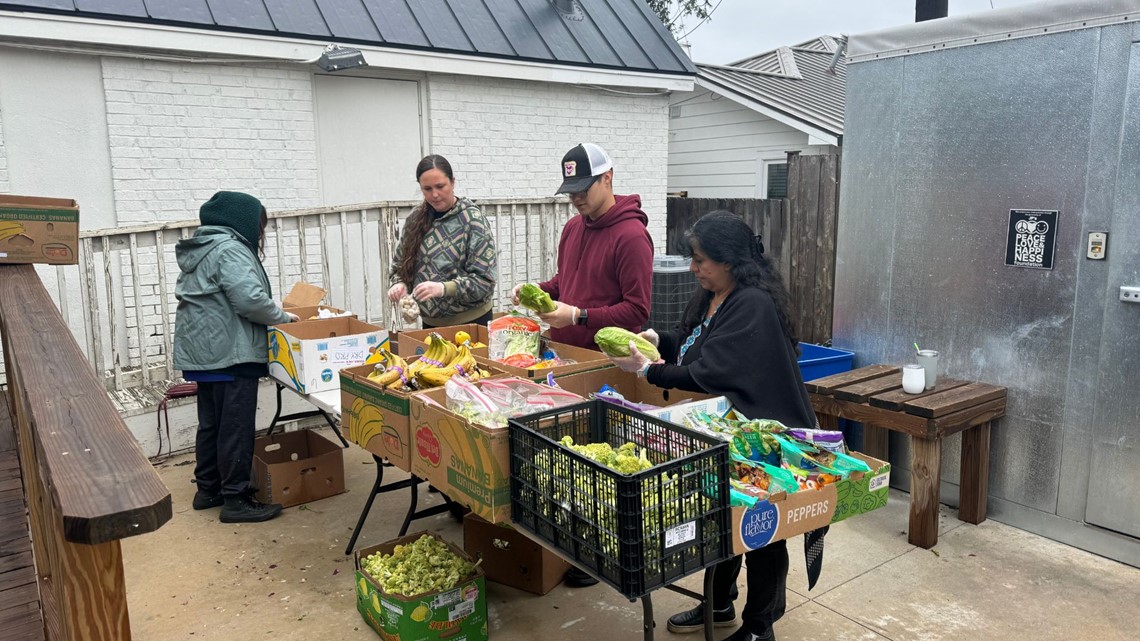Food deserts are also a problem in our region, limiting access to food as a whole since grocery stores aren’t widely available in some areas.
AUSTIN, Texas — Thousands of Austinites are classified as food insecure and live in food deserts. That means many of our neighbors may not know where the next meal is going to come from or have consistent access to groceries.
According to the city, 15% of Austinites are food insecure, which is about 200,000 people. As shocking of a number as that is, it doesn’t end there. Food deserts are also a problem in our region, limiting access to food as a whole since grocery stores aren’t widely available in these areas.
So what’s being done about it?
Kelly Wourms, the founder of Austin Bicycle Meals, is making it part of his mission to tackle food insecurity with bikes filled to the bring with food, clothes and necessities.
“I make these menstrual kits so they’ve got tampons, pads, wipes, that sort of thing,” Wourms said. “I also have a bunch of individually packed dog food that we pass out to all the pups that we see.”
Wourms started Austin Bicycle Meals two years ago after moving from Los Angeles where he was a part of something similar by loading up bags of meals for those in need.
“We’ll have anywhere from, I’d say about four to 10 plus volunteers, depending on, you know, who’s joining us that day,” said Wourms.
For unhoused people across the city, it’s a major help, but they’re not alone in facing food insecurity.
“If you want to think numbers, that’s almost 200,000 people. And of those 200,000 people, about a third of those are children,” said Lisa Barden, the Executive Director for Keep Austin Fed. “It means that they don’t know where their next meal is going to come from or their next meal is not going to necessarily be very nutritious.”
Keep Austin Fed is a nonprofit that teams up with local grocery stores to prep and deliver food. They also own and operate coolers around the city.


“Every morning we have volunteers come out here and they sort through the food,” said Barden. “Now we’re faced with inflation of grocery prices and the end of all those pandemic-era benefits. And so people are getting hit with sort of the double whammy.”
There’s also the element of crime that comes with food insecurity. Just one week after speaking with KVUE, someone broke into the organization’s cooler and stole all of their food.
But Barden says coolers can’t compare to an actual grocery store, which areas like Del Valle lack. Del Valle is considered a food desert meaning when it comes to big-name grocery stores or stores with a variety of foods in general, the area isn’t seeing these. It’s an issue council member Vanessa Fuentes says she won’t stay quiet about.
“We have families relying on convenience stores right now, and we are a prosperous city,” Fuentes said. “One of the wealthiest cities in America.”
Fuentes recently wrote a letter to H-E-B, pressing the CEO about why the company has been sitting on property in Del Valle since 2016, without building a store.
In a statement, H-E-B told KVUE, “As we review our long-term planning options it often makes sense to purchase property well in advance of our current real estate needs.”
“Why do we have to wait? You know, what does that say to us as a city if we’re saying, wait until you get the numbers, people move in and then you’ll get the infrastructure that you deserve and that is backwards. We should be providing the infrastructure on the front end for the families who live there now,” said Fuentes.
With a community of around 79,000 people and no big grocery store in Del Valle, other organizations are stepping in like No Kid Hungry Texas.
Mia Medina with the campaign says food insecurity is a problem statewide.
“Texas has the second highest level of overall food insecurity in the nation,” Medina said. “And Feeding America actually estimates that food insecurity affects about one in six kids in Texas.”
The nonprofit works closely with schools to keep kids fed. One of the big ways to do this comes from their advocacy work in the legislature. About 70,000 kids across Texas will have access to free breakfast every single school day for the next two years.
Medina, along with others, also says that a small gesture here and there can make all the difference.
“Hey, you got a little extra food or you’re at a restaurant, maybe order an extra plate. If you see somebody, give it to them,” Wourms said. “You know, there’s nothing better than just giving somebody food who’s in need.”
Ford Sanders on social media: Facebook | X | Instagram
KVUE on social media: Facebook | X | Instagram | YouTube
